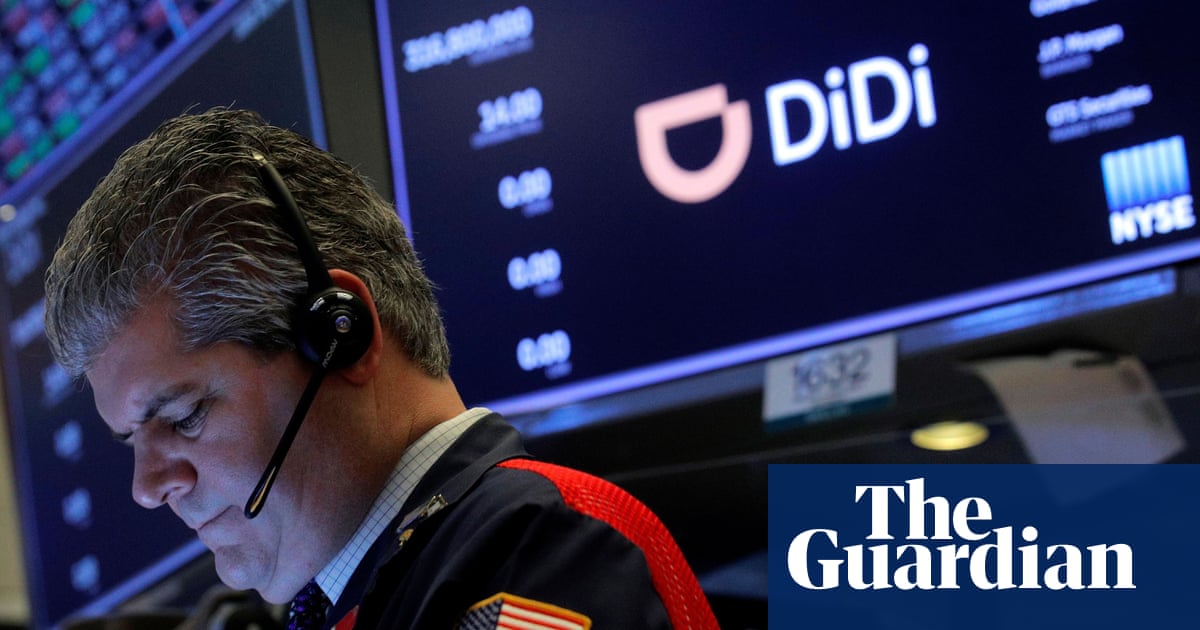China’s internet regulator opens inquiry into Didi ride-hailing service
Show caption A trader works during the IPO for Chinese ride-hailing company Didi Global on the New York Stock Exchange floor. Photograph: Brendan McDermid/Reuters China China’s internet regulator opens inquiry into Didi ride-hailing service Tech firm, which just launched its IPO in New York, is latest online giant to be targeted by Chinese authorities Vincent Ni China affairs correspondent Fri 2 Jul 2021 18.36 BST Share on Facebook
Share on Twitter
Share via Email
China’s internet regulator has launched an investigation into one of the country’s biggest ride-hailing services, Didi, two days after the company’s massive initial public offering (IPO) in New York.
Some observers believe the move against Didi is part of a continuing crackdown by the Chinese authorities on what was once a loosely regulated technology sector. It follows government actions in recent months aimed at the online marketplace Alibaba, and social networks Tencent and Bytedance, the parent company of TikTok.
Didi’s shares plummeted in the US after China’s Cyberspace Administration said in a short statement on Friday that it would be conducting a “cybersecurity review”.
It said the purpose of the review was to “safeguard national data security, maintain national security and protect public interest”. The regulator added that while the review is under way Didi will not accept registrations of new users.
In response, Didi said it would fully cooperate with the relevant government authority during the review, adding: “We plan to conduct a comprehensive examination of cybersecurity risks, and continuously improve on our cybersecurity systems and technology capacities.”
Founded in 2012 by Will Cheng at the age of 29, Didi has become one of China’s largest ride-hailing services, with more than 377 million active users and 13 million drivers across the country. Cheng, who keeps a low profile, is also the chair and the chief executive of the company.
Internationally, it is often Jean Liu – daughter of Liu Chuanzhi, the founder of Lenovo Group, the world’s largest PC vendor – who represents the company.
Didi Chuxing’s CEO, Will Cheng, and its president, Jean Liu, at a launch event in Beijing. Photograph: Sun Yilei/Reuters
The regulator’s announcement came two days after Didi Chuxing completed its IPO in New York. The company raised nearly $4.4bn, making it the largest IPO for a Chinese company in the first half of this year. On Friday, Didi Global’s stock price fell more 7% in morning trading.
The Chinese internet watchdog did not give any further details of the investigation.
In the past year, two of the country’s biggest tech giants, Alibaba and Tencent, were among major internet companies fined for failing to disclose deals in violation of the anti-monopoly law. And last month, shortly before its IPO, China’s market regulator launched an antitrust probe into Didi, according to Reuters.
“This is a warning shot to Didi and other Chinese tech companies aspiring to get listed on the New York stock market that they must comply with the regulators at all times,” said Feng Chucheng, a partner at the Beijing-based consultancy Plenum.ai. “We have long heard rumours that the regulator is against Didi’s IPO plan in the US. Such IPOs, in the regulator’s view, expose Chinese tech companies to foreign influence and make it harder for them to regulate.”
In recent months, Beijing has been intensifying its efforts to safeguard the nation’s cybersecurity. The country had nearly 1 billion internet users by the end of 2020. In April, a dozen government agencies issued Cybersecurity Review Measures, requiring critical information infrastructure operators to conduct network security reviews for technology products and services they procure that are relevant to national security or have the potential to be.
According to this new measure, a normal investigation into such a matter would take up to 30 business days to complete, with possible extensions of 15 additional business days for more complex cases.
Feng said this new dynamic between the regulator and the regulated should not come as a surprise to Chinese tech companies as they navigate their international ambitions and domestic constraints. But it’s a tricky balance for the regulator, too.
“As Chinese internet companies grow and expand internationally, it has become harder for the regulator to discipline them, while any missteps could lead to not only disruptions in the internet sector, but also social and economic issues,” he said. “The regulator realises the value of them in driving innovation, but it also cannot risk internet companies falling out of control and posing a threat to stability.”













